- Home
- Brian Garfield
Marshal Jeremy Six #8 Page 7
Marshal Jeremy Six #8 Read online
Page 7
Steve Lament stood on a flat rock overhanging the canyon. It had become his private place, the place where he came to brood. From here he had a view of the entire crowded length of the camp, when he chose to look at it.
Lament’s face had become even more gaunt since he had come to Mexico; his peppery half-gray hair was enough, added to the hollowing of his face, to make him look prematurely old.
The sky brightened, red going to orange; the shadow line slid down the steep incline almost into Santana’s camp. The hut village lay swallowed up in the cancerous spread of tents; at the head of the canyon, with light touching the tip of one pole, sprawled the horse corrals, long since outgrown: horses stood hobbled and picketed all through the tall pine tree groves. Below the trees were the half dozen old huts, the spring house, and the creek corkscrewing down past dead cookfires and blanket-rolled men just now coming awake, yawning and stretching and cursing, grinding knuckles into their eye-sockets. The night’s chill still hung, sharp and clear in the air; Lament could taste it. He had the feeling he could count the individual pine cones on the tree that towered over the stone hut at the upper end of the canyon where Carlos Santana had his bed.
Shadows were long, breakfast fires starting up, men stretching their thick strong arms by the stream. They stood near their rifles and saddles, their taste for battle whetted at Candera, at Noga, at Duran and the railroad at Teculan and the barracks at Tajo. With each victory Santana’s popularity increased, and the rebel army gained recruits. Looking on them now, Lament felt a distant sense of pride, almost as if they were his own followers.
The sun crossed the stream and dappled its surface with dancing points of light. Lament stood with his eyes hooded, breathing shallowly of the fresh raw air.
Footsteps scuffed the trail below. He wheeled, clutching a six-gun – and saw the giant Vargas coming up. Lament holstered his gun, nodded stiffly in the face of Vargas’ childlike grin and effusive greeting, and turned a shoulder to the man. Vargas ignored the rebuff. A massive, huge, muscular man, he moved out onto the rock shelf, tipped back his big sombrero and planted his hands on the butts of his twin cross-belted revolvers. He wore ammunition bandoliers across his vast shoulders. His face was huge, round, glossy brown; he said hoarsely, “A fine morning.”
Vargas was Carlos Santana’s second-in-command – big, bluff, and a good deal smarter than he acted. He said, “I used to be a shepherd. Summer we camped here. I used to sleep where Santana sleeps now. My mother taught me to read but we only had two books, we had the Bible and the Don Quixote of Cervantes. Now I can’t even remember what I read in them. A long time ago, that was. When I had seventeen years I went to fight with Benito Juarez in the south, and then I forgot about reading books.”
Vargas spread his big hands. “You see all this? You know why Santana made me his general? I’ll tell you, gunfighter, this Santana is a good man and a good fighter but he doesn’t know a single thing about handling soldiers. They have to be trained. They have to be fed. Their horses have to be grained. Santana, he knows nothing of these things. He thinks you feed two thousand men with leaves off the trees – he thinks you put a rifle in a peon’s hand and right away he is a sharpshooter. All he knows is Governor Orbea is a bad man and has to be overthrown. Gunfighter, I’ll tell you this, without Vargas there would be no revolution.”
Vargas was laughing, a low rumble in his throat. Along the creek below, men moved back and forth with great charred coffeepots. Down near the foot of the canyon figures stirred in the tent city of the camp followers: fat wives, ragged children, old men, women who called themselves laundresses. At the top of the camp Carlos Santana came to the doorway of the stone hut, watched the camp for a moment and then swung back inside. A steady stream of lieutenants and messengers flowed in and out of the stone hut, nerve center of the revolt. From his high viewpoint it all seemed diminutive and a bit unreal to Steve Lament, like a stage play. Everything had seemed not quite real to him ever since he had arrived; the recent past hung around him like a cloak made of gauze – he felt like a temporary tenant, only renting his own life, afraid … afraid of death, for the first time in his memory. His carriage had developed a certain fragility, an uncertainty of foot and action that was unlike him. Fear imprisoned him while it mocked him. Up here in these mountains he had the feeling he was dying, or already dead, and was just waiting for his body to catch up with the reality of his death.
It was Clarissa Vane, of course; he had her death on his conscience. He couldn’t shake it.
Across the canyon on a pinnacle a sentry stood up, etched against the sky with his rifle. Someone shouted – a long, ringing, distant echo. The sentry waved his hat; presently a small group of riders appeared at the bend of the creek below the camp.
Riding in the lead were a pair of Santana’s men; two more brought up the rear. In the center was a big-boned gringo, and the sight of that man sent a chill shudder through Lament. So he’s come. He did come.
Vargas was watching him. “You know him?”
“I know him.”
“Another gunfighter to help us train, help us fight.”
“Not this time,” said Lament.
“Who is he?”
“A lawman from my country.”
Vargas’ eyes were quick; he watched the horsemen below, turned and studied Lament, and said in a low rumble of hoarseness, “He has come for you?”
“Just so.”
Vargas heaved his greatness off the rock and lumbered back down the trail. Steve didn’t follow him right away. He stayed on the rock and felt the pressure of lonely fear. He did not know whether he could whip Jeremy Six with guns; there was a good chance he could. But what he did know was that he didn’t want to have to try. He hadn’t the stomach for it … not now.
He had come here to take refuge; he had found himself alone. Santana tolerated him, Vargas liked him, but the rest looked upon him with cynical curiosity, fearful awe, or downright hate. The older ones had no love for his kind: they hated gringos. The bounty hunters from Texas had come to collect rewards for Apache scalps not so many years ago, only they had made no distinctions between Apache scalps and the hair of Mexican peon farmers. Then, too, the gringo travelers on their way through northern Mexico to California had left a backtrail strewn with contempt, rape, pillage and death. The Mexicans with Santana, some of them, were old enough to recall the war of 1848 – a war of gringo aggression.
And so he had found few friends. He was a hired gun, used to traveling alone, but things had changed when Clarissa had died.
After a long time he started down the twisting trail. The sun cast his shadow ahead of him and he tramped it into the ground. His boot dislodged a stone that skittered down the side, starting a little avalanche of pebbles. He reached the bottom and still had to thread the crowded gather of tents and fires before he could reach the trampled road by the creek, pick a path through and turn upcanyon. It was going to be a very long walk, not unlike a walk to the executioner’s scaffold. Lament began it – his walk toward Jeremy Six, his walk to meet retribution. Along the way he touched his guns and shivered.
When Jeremy Six dismounted, the slowness of his movements bespoke his fatigue. The scout who had picked him up three hours back in the mountains went inside the stone hut to report. Soon a man filled the doorway, a great rock of a man ballasted with revolvers and bandoliers. The giant glared at Six. “I am Vargas.”
A man came from behind Vargas into the sunlight, fully as big as Six; it was only alongside the giant Vargas that he seemed small. “I am Santana. And you, señor?”
“Jeremy Six.”
Santana’s face was long and triangular, so that his large head did not seem too big for him. He had a short neck; the chin hung below the level of his shoulders. His eyes were slits set wide apart, separated by a great hook of a nose. He wore engineer’s boots and a faded vest over his shirt; the big handle of a Remington service revolver stuck up from his waist sash.
“I have heard of you,�
� Santana said. “Vargas, the horse.”
Vargas moved ponderously past to take up the reins of the tired animal. Santana led Six into the hut. It was a small and spartan room; a straw-tick mattress lay on the floor in the corner. The ceiling was low, the floor coarse rammed-earth. The only furnishings were a few packing crates and a clumsy handmade wooden table, littered with papers. Vargas came up and stood in the doorway, his head bowed to clear the top, and Carlos Santana said, “Tiene hambre.”
“Then I will have food brought to him,” Vargas said, and stepped outside.
Santana showed Six an enigmatic smile; he said, “Vargas is a practical man – revolutions need practical men. What do you come here for, señor?”
“Looking for a man called Lament.”
“So,” Santana said, and showed, again, his split second smile. “I thought perhaps you had come to join our revolution.”
“Maybe some other time.”
Six was about to continue but someone burst into the hut – a small figure, a waif at first glance; when Six looked around he saw it was a girl, small but full-grown, very dark and very pretty, her face clouded by anger. “Carlos—”
“Querida,” Santana said, gentle and fond.
“You waste time with this gringo while they shoot at my uncle. He may be injured, Carlos – he may be dead!”
“Have patience,” Santana said.
“Patience!”
“Patience, my love. It is hard – you are concerned only with your uncle and his Rancho Nijar, which is as it should be, but I am concerned also with thousands of men here, concerned indeed with the fate of the province. I can’t simply mount my whole army and rush to your uncle’s ranch with guns blazing.”
“And why not?” Her eyes flashed; she was, Six observed, a very beautiful little woman, spirited and passionate.
Santana had not answered her; the girl said again, “I don’t see why you don’t.”
“You see very little, my sweet one,” Carlos Santana said. His glance brushed across Six, made slightly irritable by the obvious wish that this could have remained private.
The girl said bitterly, “I hadn’t realized what a cruel man you are, Carlos. Don’t you care at all what becomes of my uncle and the others at Rancho Nijar?”
“I care very much, Elena.” With a glance at Six he added, “Now I am sure you have many things to do … we will talk later, Querida.”
She stared at him. “Yes, of course,” she said. “You are busy.” Her face turned scornful; she whipped away from him. “I shall not bother you again.”
Santana took a pace forward. “Wait – had I the time I should explain—” but she was out the door and gone.
Vargas appeared in the doorway, blocking the light. Santana gazed moodily past him. Vargas said, “Food is being brought.”
Santana said, “Any word from Rancho Nijar?”
“Not yet.”
“Hernandez should have got there by last night?”
“In plenty of time.”
“I pray for that.”
“Hernandez had a whole company of men,” said big Vargas. “More than enough to protect Nijar.”
“I hope so. I hope so. Nijar could not last a day without them.” He scowled, turned toward Six, muttered under his breath: “They must attack Nijar merely because his niece is my woman. Jackals.”
Then he lifted his long head to face Six. “Now you want to see Lament. Why?”
“Private and personal.”
“Don’t be absurd,” Santana said. The explosive way he said it made Six smile in spite of himself; Santana was so much like a professor admonishing his students. He made an incongruous revolutionary, for sure.
Santana added, “Two nights ago you were in Colonel Sanderos’ office in Guadalquivir.”
“You don’t miss much, do you?”
“Do you think I can afford to?” Santana went over to his table and sat on the corner of it, one leg free-swinging, the other stretched to the floor; he bent his head down, pretending to look at a paper document, and spoke in a spuriously casual way:
“Six, you came here to kill a man who’s very valuable to me. Everyone between here and the border knows that – you cannot keep secrets in a country like this.”
“So they keep telling me.”
Santana’s head turned slightly; his eyes darted toward Six, as if to catch him off guard, and he said, “It must be clear to you that I can’t let you have him. I need his skills. And so I have to admit you puzzle me – why did you come to me? Why didn’t you try to sneak into my camp and abduct him or kill him?”
“It would have taken me half a lifetime to find this place without your help.”
“So you let my men pick you up and bring you here. What do you expect to do now?”
“Take Lament back with me.”
“To kill him?”
“To make him stand trial.”
“And then hang him.”
“I guess so,” Six said grimly.
“I am still baffled,” Santana said. “What made you think I would just let you have him?”
Six’s face was bleak, giving away nothing. He said in a cold voice, “The woman he killed in my town was pretty well liked. Not a whole lot older than your young lady, there. Tell me this – what would you do if the tables were turned, if it was your woman he’d killed, my town he’d run away to?”
“You’re appealing to my honor? Isn’t that a great risk? How do you know what kind of man I am?”
“I only know one way to find out,” Six said.
“She was your woman, the one you say he killed?”
“Yes,” Six said, making a simple answer because it avoided qualification. He wondered if, were she still alive, he would have said to any man, She is my woman. They had been close, but there hadn’t been that possessive sense of ownership. They had never belonged to each other; now, as the realization flashed through his mind, he did not know what that meant – did not know whether it had been better or worse for that lack of possessiveness. They had each been full of independent dignity …
Santana was looking down at his paper-strewn table again; he said, “I wish things were as simple as you want them to be. I’m at war, señor. I need the use of every means available to me. Particularly Lament – I have all too few good men trained with guns. Lament has been teaching my soldiers, but the work is far from finished – we keep gaining new recruits and they need training. We are a shoestring army, we need to know how to make our own cartridges, how to repair our own weapons –not to mention how to kill with them. Lament knows these things.”
“He’s not the only gunslinger in the woods.”
“He’s the only one I’ve got right now.”
Six’s glance shot toward him; it surprised him – he had had visions of a camp crowded with expatriate American gunmen. This made it a great deal more difficult.
“You did not know that?” Santana murmured. “I’m sorry if it throws your scheme into a new light, señor. But perhaps now you see why I find it difficult to consider honoring your wish.”
“There’s still the little matter of justice.”
“A woman murdered. I know. But I’m concerned with justice for a vast population of exploited peons – not just one woman who, whatever else she may have been, is dead now and can’t be helped by me.”
Santana stood up, his eyes half-shuttered; he said, “And so, you see, I need Lament more than you do.” And he nodded slightly to the giant Vargas, still standing mute in the doorway.
When Six looked that way he saw Vargas’ guns. They were leveled and cocked.
Santana said, “Please drop your gunbelt, Señor Six.”
He stood facing Santana, his hands rope-tied behind his back, his gun taken from him. Santana said to him, “Six, listen to me – guns are going off, you can smell smoke. I need men like you.”
“Not my line, I’m afraid,” Six said, and found himself liking this big shaggy rebel leader. He said, “Before you dump me
in your hoosegow, I’ve got a message for you from Captain Medina. He said there’s a brigade of army reinforcements on the way from Ures to Guadalquivir to beef up the Governor’s forces. They left Ures night before last. I guess that’s supposed to mean something to you.”
“It does. Thank you for the information – although of course I had already received it from other sources.”
“A test?”
“One always likes to know who one’s friends are.”
“But it won’t buy me much, will it?”
Santana smiled. “I appreciate your understanding.” In the door, Vargas stepped out, spoke briefly to someone outside, and in a moment came inside with a plate of simple food, which he placed on a corner of the big table. Santana nodded to him and Vargas went around behind Six to untie his hands. When Six looked around, Vargas had stepped back against the wall and was holding a gun trained on him.
“Eat,” said Santana.
“And then what?”
“I’ll have to keep you in custody for a while.”
“I’ve got a town depending on me. They expect me back within a week.”
“They’ll have to do without you for a while. Eat.”
Too hungry to object, Six moved to the table and began to eat, standing up. Santana said, “Don’t you care at all about what’s going on down here?”
‘It’s not my fight, is it?” Six chewed the spiced meal slowly, his mind working energetically. “I’ve seen revolutions down here. There was a time when your Governor Orbea was a rebel himself. He spouted all lands of principles too – rights, justice, reform. Until he won.”
“Orbea’s day is past. Yes – it is a question of rights and justice. The ignorance of men doesn’t give Orbea’s thieves the right to rob them, even though it may make the theft easier. My people are too hungry to fight for their rights without leadership – and so, it’s left to men like me. I won’t pretend false humility, Marshal – I’m not a humble man. I fight this revolution because I want to lead the people. I think I can lead them better than those who now have the power.”

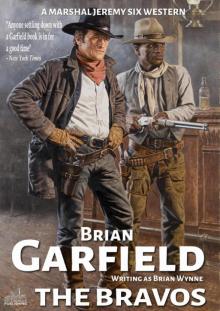 Marshal Jeremy Six #3
Marshal Jeremy Six #3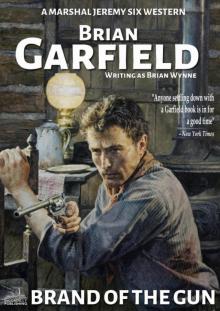 Marshal Jeremy Six #6
Marshal Jeremy Six #6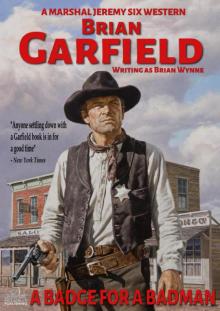 Marshal Jeremy Six #5
Marshal Jeremy Six #5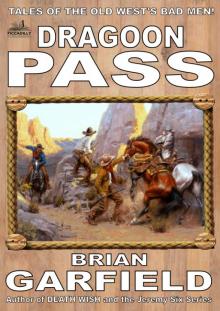 The Outlaws 2
The Outlaws 2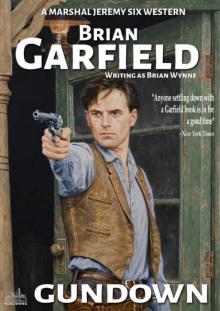 Marshal Jeremy Six #7
Marshal Jeremy Six #7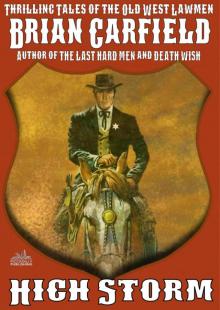 The Lawbringers 4
The Lawbringers 4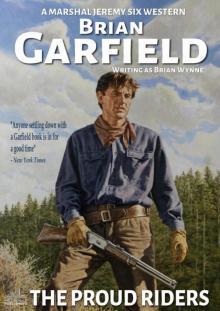 Marshal Jeremy Six #4 the Proud Riders
Marshal Jeremy Six #4 the Proud Riders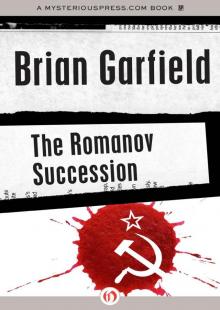 The Romanov succession
The Romanov succession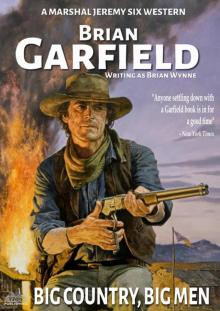 Marshal Jeremy Six #8
Marshal Jeremy Six #8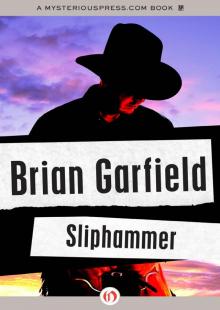 Sliphammer
Sliphammer Line of Succession
Line of Succession Deep Cover
Deep Cover Kolchak's Gold
Kolchak's Gold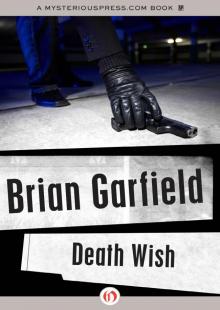 Death Wish
Death Wish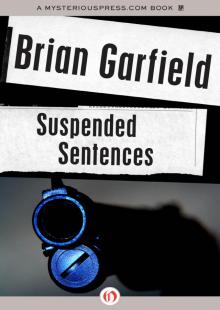 Suspended Sentences
Suspended Sentences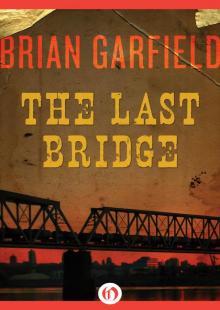 The Last Bridge
The Last Bridge Relentless
Relentless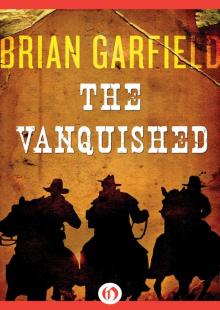 The Vanquished
The Vanquished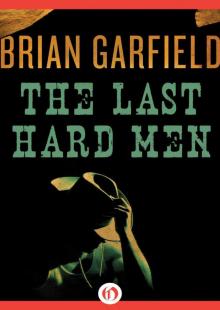 The Last Hard Men
The Last Hard Men Hit and The Marksman
Hit and The Marksman Villiers Touch
Villiers Touch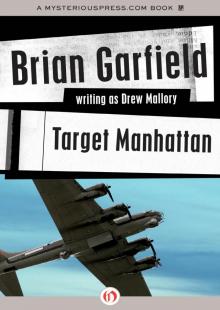 Target Manhattan
Target Manhattan Marchand Woman
Marchand Woman What of Terry Conniston?
What of Terry Conniston?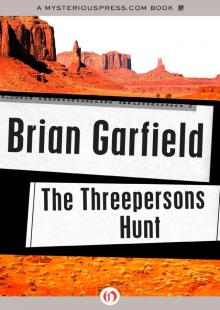 Threepersons Hunt
Threepersons Hunt Checkpoint Charlie
Checkpoint Charlie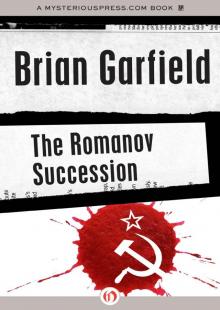 Romanov Succession
Romanov Succession Necessity
Necessity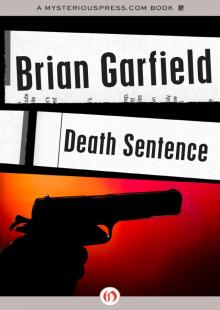 Death Sentence
Death Sentence Fear in a Handful of Dust
Fear in a Handful of Dust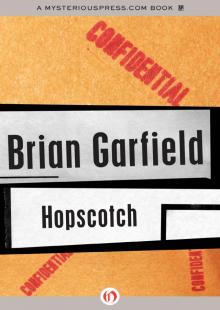 Hopscotch
Hopscotch